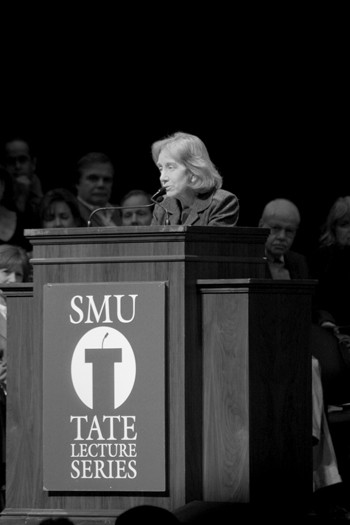
Presidential Historian Doris Kearns Goodwin speaks at the Tate Lecture on Tuesday night. (James Bilowus)
At the Lacerte Family Lecture Monday night, part of the Tate Lecture series, Pulitzer Prize winning author and acclaimed historian Doris Kearns Goodwin described Abraham Lincoln’s superb skill at empathizing with people. As she described Lincoln’s uniquely close relationships with his cabinet members and provided anecdotes about the presidents who are the subjects of her previous books, Goodwin’s own skill at empathizing enabled her audience to visualize little-known sides of these famous figures.
While Lincoln’s empathy allowed him to get along with those who should have been his enemies and to see the value of every member of his constituency, Goodwin’s ability to put herself in the hearts and minds of presidents allows her to recognize and share with others the humanity of these men who held positions of extraordinary power.
The Kennedys, Lyndon B. Johnson, and Franklin and Eleanor Roosevelt have all been subjects of some of Goodwin’s books. She received a Pulitzer Prize in 1995 for No Ordinary Time: Franklin and Eleanor Roosevelt: The Home Front in World War II. She also assisted LBJ in preparing his memoir, The Vantage Point, after serving as a special assistant to him during his presidency.
“As a White House fellow, she wrote on article criticizing President Johnson’s foreign policy,” President R. Gerald Turner said. “He was given it and then asked her to be his special assistant.”
Team of Rivals: The Political Genius of Abraham Lincoln, Goodwin’s most recent work, won the 2006 Lincoln prize and has been optioned by director Steven Spielberg, who plans on making it into a film with Liam Neeson starring as Lincoln.
Goodwin became interested in history as a young child. When she was six years old, her father had her keep score of the Brooklyn Dodgers games while he was at work, and she would later recount these games to him in exact detail, getting so excited that she would sometimes reveal the outcome of the game before she finished describing all the plays.
“I think I learned the art of narrative at this time,” Goodwin said. “I learned that you have to tell a story from beginning to middle to end to keep your audience with you. You have to imagine that you don’t know that outcome of a war while you are describing it.”
When her father died of a sudden heart attack when she was in her twenties, she passed his memory and his love of baseball on to her sons.
“His heart and soul they have come to know through all the stories I have told,” Goodwin said.
During questions following the lecture, Goodwin was asked her opinion regarding the value of the Bush Presidential Library should it come to SMU. She was positive about what the library would mean for SMU, reflecting upon the importance of other presidential libraries in her work as a historian.
“Anyone who wants to relive this time will come to the library,” Goodwin said. “For generations, people will be coming here to learn about 2001 and the past decade.”
Goodwin’s own son, who graduated from Harvard, decided to join the army after Sept. 11 and became a platoon leader in Baghdad.
Goodwin said she understood the controversy surrounding the placement of the library on SMU’s campus but believes, “We have to learn from both the mistakes and successes of history,” and that the museum would be “an enormous attribute.”








